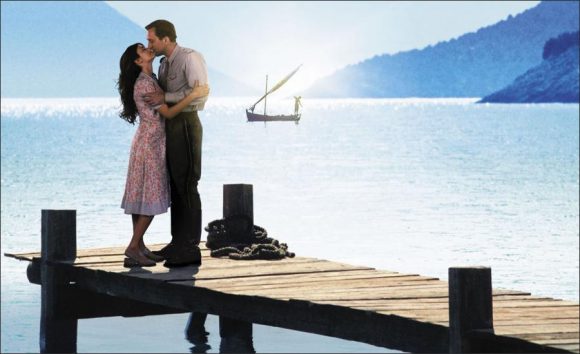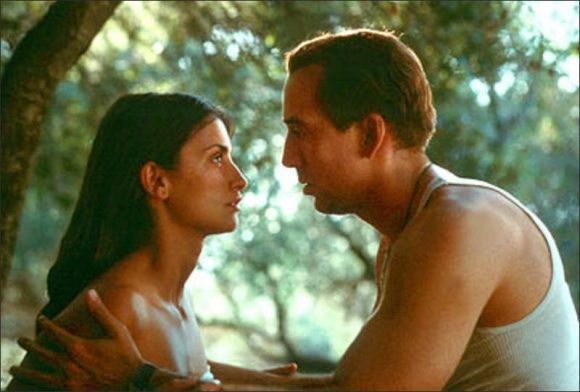Captain Corelli’s Mandolin looks splendid – how could it not?
Just two years ago, we left Hugh Grant lounging in a Notting Hill square, with a pregnant Julia Roberts snuggling up to him, and, like millions of others, he was reading a paperback with that unmistakable Mediterranean-blue jacket design. It was a cute bit of advance product placement for production company Working Title’s next project: Captain Corelli’s Mandolin, the story of a lovely young Greek woman and her affair, during the second world war, with a captain from the occupying Italian forces.
The gestation period is over, and the movie is here – but in the meantime, of course, its reputation as a “property” has developed unhelpfully. The author Louis de Bernières became testily defensive about his alleged right-wing bias in the depiction of the Greek communist partisans, and, indeed, about his alleged disapproval of the film itself, which excises the difficult sex and politics and turns it into a holiday romance with silly voices on the beautiful sun-kissed island of Cephallonia.
What a droopy, disappointing film this is. It has some of the unhappiest casting to be seen and dodgiest accents to be heard in the cinema, the worst offender being the barrel-chested, horse-faced Nicolas Cage as a captain in the Italian army (the comically incompetent innocents of fascism, apparently) who charms the socks, and indeed the pants, off the gorgeous Pelagia (Penelope Cruz). This he achieves with his sensitive love of music and that famous mandolin, which he has nestling pertly in his knapsack in lieu of a field marshal’s baton. He and his adorable comrades want nothing more than to hang out on the beach, running in and out of the surf like the Monkees, singing and snogging their imported ladies of ill repute. “We are-a Italian-a!” explains Mr Cage, with a twinkle in his eye, “famous-a for-a singing-a! Eating-a! And making-a leeeeeeeurrrve!”
When he gets his mandolin out and starts twanging away, everyone swoons, but the idea of music transcending the divisive brutality of war and nationalism is completely lost. The music in the film is dire: Cage’s singing is groan-inducing (I’m pretty sure it’s not supposed to be that bad) and Corelli’s composition, Pelagia’s Theme, sounds sugary and bland. Frankly, no one could look more ill-at-ease or unconvincing with a musical instrument, and with so much broad comedy in his performance it would not be very surprising if Cage tried blowing into it.
So much for the American playing the Italian. Cruz is Spanish playing a Greek speaking in English in a kind of non-specific European voice; and David Morrissey (a generally excellent actor here forced into the role of uptight German officer) appears to be history’s only recorded Scouse Nazi. The only actor really at home seems to be John Hurt as Dr Iannis, Pelagia’s father – his face lizardly, impassive and sunburned, the corners of his mouth turned uncompromisingly down. He has the film’s one really disturbing and powerful moment, when, as war is declared, he gives Pelagia a revolver – an oddly new-looking and well-maintained weapon – and tells her that she must not hesitate to use it on herself if necessary.
What tears at Pelagia’s heart is that before war came, with its inappropriate and unpatriotic longings, she was betrothed to Mandras (Christian Bale), a stout-hearted local fisherman who enlists and then returns to join the communist partisans following an unequal military struggle against the Italians and Germans. These are not the villainous brutes of the novel, but Mandras is nevertheless shown turning a blind eye as a local woman is lynched for consorting with a German officer. (Perhaps it should be said that De Bernières’ demonisation of the Greek communists is arguably in a distinctive British tradition inherited from Churchill, who boasted of saving post-war Greece from Stalin and was openly contemptuous of the partisans’ struggle against the Nazis.)
But Mandras redeems himself at the end, and in any case, when Mussolini surrenders to the Allies, the Italians inherit the Greeks’ victim status, and the movie shows them appearing to make a kind of chaotic, muddled common cause with Greece against the Third Reich.
John Madden’s picture looks splendid – how could it not? – and the battle scenes in the final reel are managed with elan. But all the vitally emotional warfare is muted. So much emphasis is placed on the picturesque innocence of Pelagia’s love in this Eden-like setting, and a miraculously equivalent innocence on the part of an Italian army officer, that the harsh realities of war, violence and betrayal seem weirdly pallid and inconsequential.
In the end, Cage’s Corelli and Cruz’s Pelagia seem more like children than much else: babes in the dark wood of 20th-century history – and perhaps that is part of the story’s popularity. But you long for the film to grow up and give us a story about plausible adults.
All about Captain Corelli’s Mandolin movie.
Captain Corelli’s Mandolin (2001)
Directed by: John Madden
Starring: Nicolas Cage, Penélope Cruz, John Hurt, Christian Bale, David Morrissey, Irene Papas, Patrick Malahide, Viki Maragaki, Gerasimos Skiadaressis, Mihalis Giannatos
Screenplay by: Shawn Slovo
Cinematography by: Jim Clay
Film Editing by: Mick Audsley
Costume Design: Alexandra Byrne
Set Decoration by: John Bush
Art Direction by: Gary Freeman
Music by: Stephen Warbeck, John Toll
MPAA Rating: R for some violence, sexuality and language.
Distributed by: Universal Pictures (International), Miramax Films (United Kingdom)
Release Date: May 4, 2001 (United Kingdom), June 20, 2001 (France), August 17, 2001 (United States)
Visits: 96







